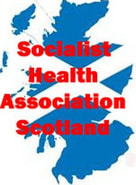The Secretary of SHA Scotland wrote this section on health and social care.
------------------------------------------------------------------------------------------------------------------------------------
The COVID-19 pandemic has reinforced the importance of our health and care systems and those who deliver them. After a decade of austerity, our health and care services were stretched before the pandemic; we must not repeat the mistakes of the past. Whatever the lessons of Operation Cygnet and Silver Swan2016 pandemic exercises were, governments in Scotland and Britain have demonstrated limited preparedness. Not least with testing, personal protective equipment (PPE) supplies, and the provision of intensive care beds. Socialist Health Association (SHA) President, Allyson Pollock, highlighted the failure to follow the WHO scientific advice in the British Medical Journal. Case finding, contact tracing and testing, and strict quarantine are the classic tools in public health to control infectious diseases. In Singapore, Vietnam, and South Korea meticulous contact tracing combined with clinical observation plus testing were vital in containing the disease. In Scotland, as in the rest of Britain, contact tracing was abandoned early in the pandemic, and testing has been described as ‘wholly inadequate’. Britain has been one of the hardest hit countries by the pandemic. The response has been proved to be one of the least effective as governments have struggled to get on top of the crisis. As scientists at the University of Edinburgh have shown, a lockdown two weeks earlier might have reduced the death rate in Scotland by 80%.
Many more people than average have died from cancer, heart disease and dementia in Scotland since the pandemic broke out. There will be extensive delayed diagnosis and increased demand for services that have been deprioritised during the crisis. For example, some 2,000 urgent cancer referrals are not happening every week in Scotland. There is also a significant concern about antibiotic resistance. Purging the population of this virus will not be easy.
It has been great to see the community support for our NHS hospital, community and social care workforce who have responded magnificently to the crisis. Welcome though the claps are, workers have all too often been left exposed to unacceptable safety risks. Staff welfare should be prioritised given the stress many have worked under, and our gratitude for all their efforts recognised in pay and conditions. This includes support for informal carers who have also faced additional pressure during this crisis. With a projected global shortage of 15m health and care workers by 2030, workforce planning is particularly urgent, with added pressures from Brexit and the new Westminster Immigration Bill.
The pandemic has exposed the frailty of our fragmented and under-resourced social care ‘system’ in Scotland. Data (at week 18) shows that 42.8% of deaths from Covid-19 were in care homes, who have struggled with inadequate staffing and very limited PPE. The agreement reached with the Scottish Government to finally pay the Scottish Living Wage for all social care workers delivering public contracts, now, without 32 sets of negotiations, demonstrates that a Scottish Care Service is deliverable – setting a consistent framework for social care while retaining local delivery. This must include addressing the fragmentation of delivery and the balance of ownership models. We need integration and parity of esteem.
We will also need to reflect on how NHS Scotland needs to reform after the pandemic. We will certainly need a strengthened public health function. Now may also be the time to reflect how contracted health services, including, GPs, community pharmacy, dentistry and opticians, were impacted during the pandemic and how greater integration might help.
It has been claimed that COVID-19 is a ‘great leveller’. The emerging data shows it is nothing of the sort. As ever, it is the poor and vulnerable who suffer the most, with particular concerns for BAME groups and the elderly. The lockdown and closure of schools is expected to exacerbate existing educational inequalities. The pandemic is already increasing health inequalities and any return to austerity economics will exacerbate inequality. The ‘new normal’ must effectively tackle health inequalities with radical action on income support, household debt, social security, housing, public services and the environment. With interest rates at record low levels, there is no urgent requirement to pay back debt, and we should fund increased spending by tackling tax avoidance and taxing wealth. We need to argue for a better society with less inequality and built by eliminating child poverty. That means improving working conditions to ensure that everyone has the minimum income to lead a healthy life and creating a sustainable environment in which to live and work – and so creating the conditions for people to pursue healthy living.
Dave Watson, Secretary of the Socialist Health Association Scotland

 RSS Feed
RSS Feed